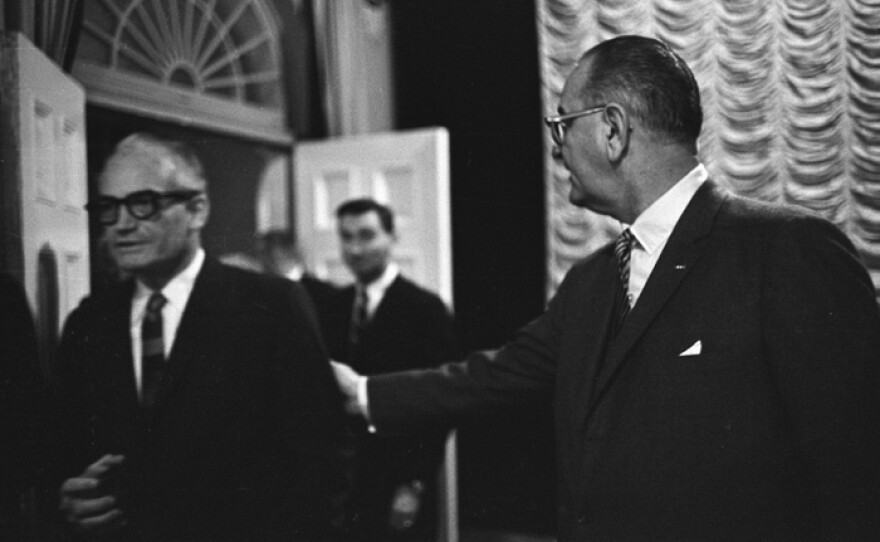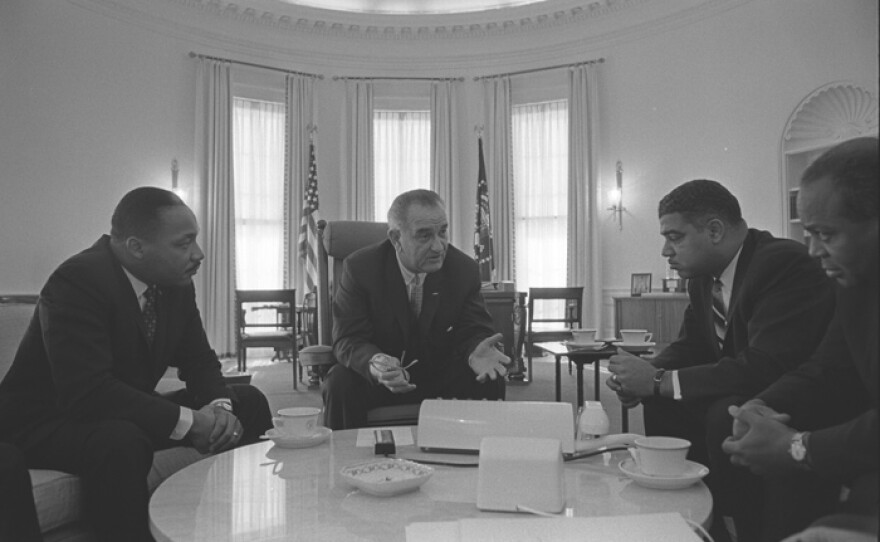1964 was the year the Beatles came to America, Cassius Clay became Muhammad Ali, and three civil rights workers were murdered in Mississippi. It was the year when Berkeley students rose up in protest, African Americans fought back against injustice in Harlem, and Barry Goldwater’s conservative revolution took over the Republican Party. In myriad ways, 1964 was the year when Americans faced choices: between the liberalism of Lyndon Johnson or Barry Goldwater’s grassroots conservatism, between support or opposition to the civil rights movement, between an embrace of the emerging counterculture or a defense of traditional values.






Film Quote
“In 1964, we see everything being called into question, from our relationship with our government and the military to our notions of free speech and individual freedom,” says AMERICAN EXPERIENCE executive producer Mark Samels. “We see the schisms widen between young and old and liberal and conservative. 1964 was the year that America came apart, and out of that discord was born the America we have become.”
Based in part on "The Last Innocent Year: America in 1964" by Jon Margolis, "1964" follows some of the most influential figures of the time — Lyndon Johnson, Barry Goldwater, Betty Friedan — but also brings out from the shadows the stories of ordinary Americans whose principled stands would set the country onto a new and different course. “1964 was when, for better or worse, the outlines of the America we live in began to be visible,” says writer/director Stephen Ives. "1964" premiered on AMERICAN EXPERIENCE on Tuesday, January 14, 2014 on PBS.
As champagne popped on December 31, 1963, America’s optimism was tinged with a deep anxiety. Just five weeks earlier, President Kennedy had been assassinated, leaving Americans shaken and vulnerable. Eight days into the new year, the new President, Lyndon Johnson, gave his first State of the Union address, demanding an end to racial injustice and an “unconditional war on poverty in America.”
Only a few days earlier, Arizona Senator Barry Goldwater had announced his intention to seek the Republican nomination for president, igniting a conservative movement that would reshape the politics of 1964 and transform the American political landscape for generations to come.
Everywhere one looked in 1964, old conventions and attitudes were under assault. The arrival of the Beatles electrified teenagers across the country. One day after shocking the sports world by defeating Sonny Liston and becoming the heavyweight champion of the world, the young Cassius Clay announced he had become a Muslim, declaring, “I don't have to be what you want me to be. I am free to be who I want.”
It was a mantra that seemed to be rippling throughout American society in 1964. Housewives across America were finding a new voice as well. Awakened by Betty Friedan’s bestseller "The Feminine Mystique," millions of mostly middle-class women began to reject their conventional roles in society and embrace new identities and new values, sparking a feminist movement that would transform American culture.
In the spring, visitors flocked to the New York World’s Fair where the stylish Ford Mustang made its debut. On the political front, seismic change could also be felt. At his commencement address at the University of Michigan, President Johnson called upon the graduates to help him build a “Great Society,” and used his legendary powers of persuasion to engineer the passage of the landmark Civil Rights Act of 1964. But even with such a historic federal commitment to advance the cause of equality, racial unrest, in both the rural South and the cities of the North, would continue to fester.
During the summer of 1964, Martha Reeves’ “Dancing in the Street,” became an unexpected anthem for a nation in the midst of radical social change. In June, nearly 300 students and veteran civil rights activists joined together to launch Freedom Summer, a nonviolent campaign to challenge Mississippi’s voter registration laws.
On June 21, three of the young activists — two whites from the North and a local black volunteer — went missing. While the search for the men continued, the killing of a black youth by a white police officer in Harlem triggered an explosion of violence and looting that shocked the nation. For the first time, the racial violence that had defined the civil rights struggle in the South was now consuming a northern city.
On August 4, 1964, the bodies of the three Freedom Summer volunteers were finally found. As classes began on the campus of Berkeley, hundreds of young people, including many Freedom Summer veterans, began to demonstrate for racial justice in the Bay Area. When the university administration tried to crack down on the students, the Free Speech Movement was born.
The Berkeley protests were a spontaneous expression by a generation of affluent young men and women who, for the first time, began to flex their political muscle and demand a seat at the table. Their nonviolent, highly organized, grassroots style of protest would become the model for student protest and student activism that would reverberate throughout the decade.
That November, Johnson was elected president by a landslide. But his fight for civil rights in the South transformed the previously Democratic region into a formidable block for the emerging Republican right. In the years to follow, Johnson’s dream of a Great Society would be shattered by the long and divisive war in Vietnam.
Out of the ashes of Goldwater’s defeat, young Republicans regrouped and finally made good on their conservative revolution. Young people increasingly embraced the growing counterculture and women, awakened by the ideas set forth in "The Feminine Mystique," would go on to champion a revolution that forever changed the nature of American society.
"1964" will be available on DVD on January 15, 2014, as well as for online viewing at pbs.org. AMERICAN EXPERIENCE is on Facebook, and you can follow @AmExperiencePBS on Twitter.





